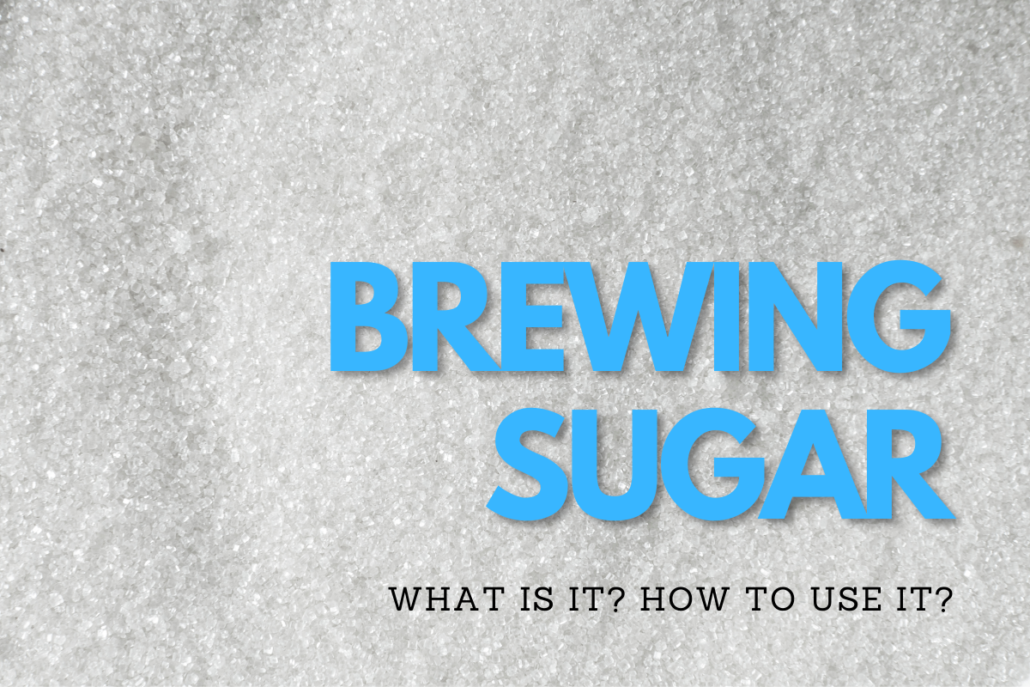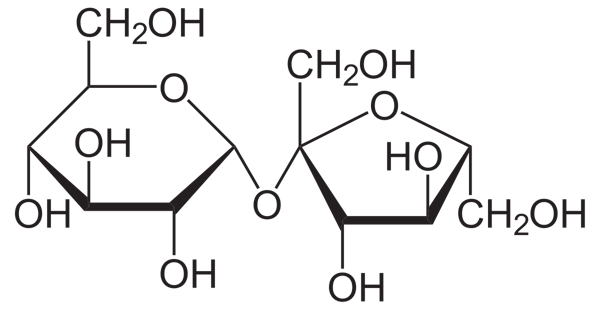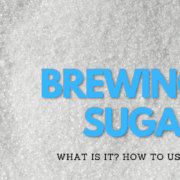What Is Brewing Sugar & Should You Use It?

You may have seen “brewing sugar” listed on recipes or beer kits and not known what the difference is between brewing sugar Vs regular sugar.
Does it make a difference? In this post we will take a look at what brewing sugar is and help you decide whether it is necessary to use it in your home brewing.
Table of Contents
What’s The Difference Between Brewing Sugar vs. Normal Sugar
This is the crux of the issue, if there is a difference between the two then maybe it is beneficial to use one over the other.
What Is Brewing Sugar?
Brewing sugar is dextrose monohydrate. This particular type of sugar is a monosaccharide which means that it has one molecule of glucose.
Dextrose is a simple sugar and depending on where you live it may be the regular type of sugar you already use in the kitchen.
Corn sugar is dextrose and therefore exactly the same as brewing sugar.

What Is Table Sugar?
Regular sugar or table sugar is sucrose which is a disaccharide. This means that there are 2 molecules of sugar joined together although this doesn’t mean it provides twice the amount of sugar.
Dextrose and sucrose provide the exact same amount of fermentables and can be used on a 1:1 ratio.

The Difference?
The difference between brewing sugar and normal sugar when it relates to fermentation is the way that the yeast process the sugar.
Both monosaccharide and disaccharide are 100% fermentable but brewing sugar, the monosaccharide is easier to ferment by the yeast.
Disaccharides like table sugar require the yeast to first break the bonds of the sugar molecules which means the yeast create additional compounds.
An enzyme called invertase is used by the yeast which break down sucrose in simpler sugars like glucose.
This may have other effects that we will now take a look at.
Is Using Brewing Sugar Better Than Using Normal Sugar?
Deciding whether brewing sugar is better to use than normal sugar will depend on how it is being used and your goals. Let’s take a look at some practical examples.
Using Higher Proportions Of Sugar
I know that a lot of beer kits that instruct you to add sugar suggest brewing sugar.
In some of these beer kits up to a kilo of sugar is used which makes up a large part of the fermentables going into the beer.
In this case, it may be preferable to use brewing sugar. As brewing sugar is a monosaccharide the yeast don’t have to create utilise any additional enzymes to start fermenting.
This will mean the yeast has less work to do in order to start fermenting as they prefer to ferment simple monosaccharide sugars.
I also make a lot of fruit wines that use a large amount of sugar in the recipe. Unless I use a flavoured sugar like honey I often use brewing sugar or dextrose as I feel this is where it has the biggest impact.
Whether this has an effect on flavour is arguable. There are some who think it does and others who think there is no noticeable effect on taste.
There is almost certainly more happening during fermentation when you use a more complex sugar and we know fermentation is really important in terms of how beer or wines taste so you may want to consider using brewing sugar when you are using a high proportion of sugar in your recipe.
When You Want The Least Flavour From Sugar
Sugar is used in many beers for flavour and also in wine and mead for adding flavour.
Brown sugar, honey, caramel, maple syrup all contribute flavours as well as sugar to the finished product. If you want to add a unique flavour to your homebrew then you can consider using one of these sugars in the fermentables.
When you want to add as little flavour as possible, such as priming sugar to carbonate or adding sugar to thin out the body of a beer for example we want to choose a sugar that adds the least amount of flavour.
The best way to see which sugar has the least flavour is to try them all. Once you have tasted them you will probably come to the conclusion that plain white sugar has the least flavour.
Comparing dextrose alongside sucrose or table sugar you will notice that table sugar is a lot sweeter. Sucrose which is a polysaccharide is said to be around 30% sweeter than dextrose.
When you taste dextrose it does taste very plain and not as sweet as you imagine.
Now when you add sugar to a batch of beer it doesn’t add sweetness to the beer because 100% of the sugar is fermented out. Does that sweetness leave any residual flavour? Maybe.
I use dextrose over sucrose because I feel it is more neutral but I can’t be certain so I will leave it up to you.
Can You Use Normal Sugar Instead Of Brewing Sugar?
Yes, normal table sugar or white granulated sugar is perfectly fine to use in the vast majority of cases you’ll be hard-pressed to tell the difference.
When you are only using a small amount of sugar, for example, when you are carbonating beer in bottles you are not going to be able to tell the difference unless you have super-sensitive taste as well as a subtly flavoured beer.
You may want to consider using brewing sugar when you are using a larger proportion of sugar in your fermentables and you want the least discernable flavour to come from that sugar addition. Beer kits that use a large amount of sugar are the obvious examples here.
I do use brewing sugar occasionally when I have it on hand and like to use it to make fruit wines that require a large amount of sugar in the fermentables.




Leave a Reply
Want to join the discussion?Feel free to contribute!